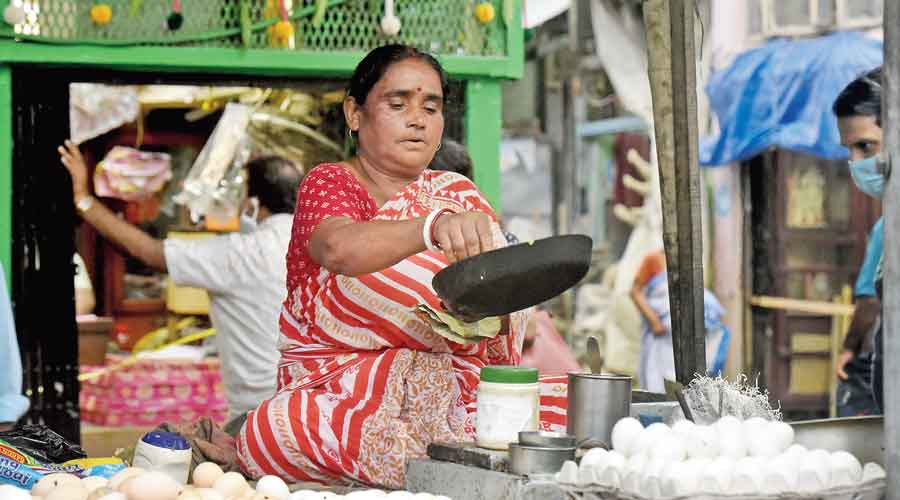As usual, Kumartuli, the idol makers’ hub in north Kolkata, is now gearing up for the big event of the year. The Mother Goddess and her family are being readied for their annual arrival at their earthly abodes in a few weeks.
Rows of idols, some gigantic, stand inside the shops, many just clay figures now, yet to be painted. Other figures, human and hybrid, abound too. A Spiderman hangs from the top of a shop. Apsara figures stand next to huge Vivekananda statues. The divine, the human and the phantasmagoric blend and cast their larger-than-life shadows on everything around.
So it is easy to miss a small figure perched on her stall at the entrance to the main Kumartuli lane, off Rabindra Sarani in north Kolkata.
Nandarani Maity, 52, is always there, surrounded by little heaps of eggs. She sells steaming hot boiled eggs, of four kinds, no less, sliced into halves and sprinkled with a special masala. There is something pristine and life-giving about fresh, warm boiled eggs.
Nandarani has been running the stall for the last 25 years or so. Before her, her father-in-law did it. Now, it is almost a ritual for some regulars at Kumartuli to first have an egg or two — or more — on a shaal leaf at the stall, a very popular destination in the run-up to various pujas, before entering the idol para.
For those looking beyond the boiled egg, Nandarani has mamlets (omelettes, fried the Bengali way in mustard oil with onions and green chillis) or dim pauruti (mamlet wrapped round a thick slice of bread) on offer.
On an evening a few days before Viswakarma Puja, she is moving from order to order, a clay oven burning on her left. She is boiling or frying the eggs, and serving them, receiving the payment and returning the change in one brisk motion.
Her husband, Subhas Maity, is around to help her. Customers, including local residents looking for a snack, are flocking to her stall. A smiling, friendly person, she is “Didi” to many, but is also quite formidable, for which she commands respect.
The stall’s life coincides with Kumartuli’s season.
“It used to begin with Viswakarma Puja and end with Saraswati Puja. Now it starts earlier, with Ganesh Chaturthi,” says Nandarani. “The remaining six months we hardly have any business, but from around this time every year I come here around four in the evening and stay on beyond midnight.”
As the footfalls increase before Durga Puja, she keeps her shop open till six in the morning. “Then we sell about 900 to 1,000 eggs a day,” says Nandarani.
Business continues with Lakshmi Puja, Kali Puja and Saraswati Puja, after which Kumartuli season gets over.
“Then we may be selling not more than a hundred eggs a day,” says Nandarani. She and her husband live in one room in a slum behind Kumartuli. The most expensive item at her home is a fridge, where she keeps the unsold boiled eggs.
She does not eat eggs herself, preferring simple vegetarian meals or a light fish dish. “Otherwise we cannot keep working like this.”
A boiled egg — the four varieties being poultry egg, country chicken egg, duck egg and double yolk egg — are priced between Rs 10 and Rs 15. The mamlets and the bread items cost a little more.
“I boil them for 10 minutes,” she says.
“The worst is the mango season,” says Nandarani. “Then people stop eating eggs altogether,” she declares and tells a vendor sharply that the eggs he sells are not up to the mark.
She has three grown-up children — two daughters and one son. None of them could study beyond Class VIII. When they were young, Subhas worked as a tailor, which he cannot do any more because of ill-health.
Their son lives in Indore now. Every mango season, when eggs stop selling, he comes down and all of them leave for their Midnapore village, where Subhas grew up. They stay there for two months or so, before resuming business at Kumartuli again.
Nandarani has been living here for many years. “I was married at 14,” she says.
She grew up in Uluberia in Howrah, in the locality Gate No. 58. After marriage, she came to stay with her husband’s family in Calcutta. After a few years, she began to help her father-in-law manage the egg stall. After him, she took over the stall.
The lockdown stopped her business. “It was very difficult for us,” she says. But the gods have blessed her always, she feels.
“I have every god at home. My husband has got me brass idols. The latest is one of Bajrangbali,” she says.
During Puja season, Kumartuli turns into one long, human procession of idols, men, vehicles. There must have been many memorable encounters?
“They have tried to say things to me, as some will,” says Nandarani. “But I have never given in.” She does not clarify who they are. “So many things have happened in my life.”
But asked to mention a few, she falls silent. “My husband and I just barely manage to make enough to survive. That’s all that concerns me. I don’t have time to talk to customers or think about anything. I want to go on working like this till I can,” she says.
She does not have anything to say because she thinks that her life is not memorable in any way. She also looks surprised when told that there is something special about the eggs she serves.
“I don’t know. But I will tell you something. People from as far as Jadavpur come to eat these eggs. It may be the masala.” It has cumin, coriander, peppercorns and red chillis, all roasted, mixed with salt, rock salt and mango powder.
Maybe. But it may also be the spirit of the place, inhabited by another Mother, a wife, someone who looks after her family and yet battles on all fronts.
